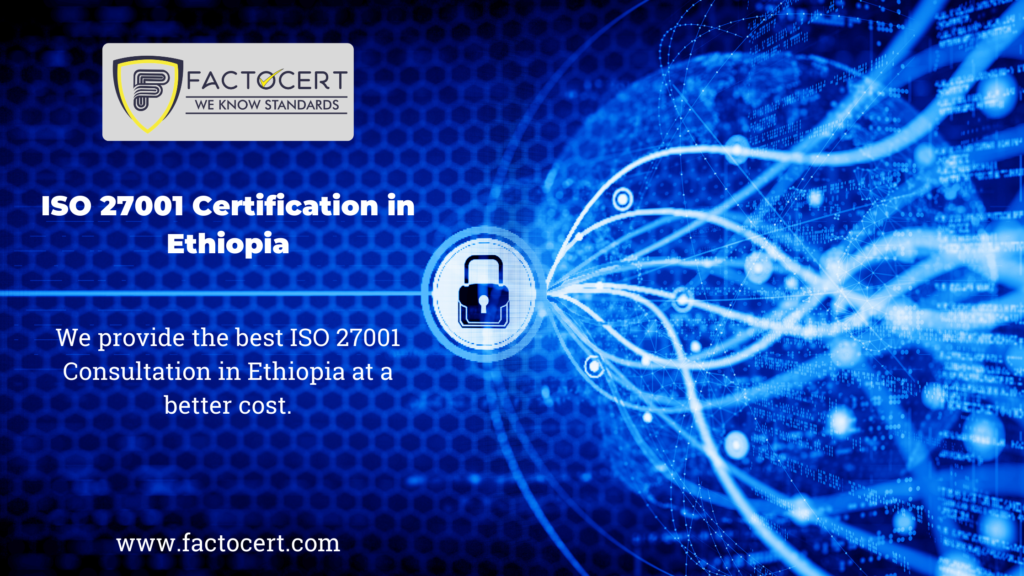ISO 27001 Certification in Ethiopia is an international standard for helping businesses ensure the security of their information assets. It is a framework for management to implement ISMS (information security management system) to ISMS (information security management systems) to guarantee all information security, confidentiality, integrity, and availability (such as intellectual property information, financial information details of employees, as well as information that third-party organizations manage).
It was released in 2013 by ISO (International Organisation of Standardization) and IEC (International Electrotechnical Commission) and was part of the ISO 27000 family of standards. It is the sole internationally recognized and certified information security standard.
What exactly is ISO 27001 certification in Ethiopia?
ISO 27001 certification in Ethiopia demonstrates that your company has put money into the process, people, and technology (e.g., tools, equipment, and systems) to secure your organization’s information and provide. A professional, independent evaluation of how your data is secured.
Certification is obtained through a recognized certification organization that proves to your customers, investors, customers, and other interested people that you have managed information security by the international standard of best practices.
ISO 27001 Certification in Ethiopia compliance is increasing in importance as regulations (such as GDPR, HIPAA, and CCPA) require companies to safeguard the personal information of their customers and clients.
How can ISO 27001 Certification in Ethiopia audits work?
The certification is granted after an accredited certification body has completed an audit outside the organization. Auditors will examine the company’s policies, practices, and procedures to determine whether the ISMS complies with the Standard’s specifications.
The certification usually lasts three years. However, companies must conduct periodic internal audits to ensure a continuous improvement process. After being accredited, the certification organization typically conducts an annual review to ensure compliance.
ISO 27001 controls and specifications
ISO 27001 consists of 114 controls (included in Annex A and expanded upon to fit in ISO 27002) that provide the framework for identifying, addressing, and managing information security risks.
An overview of ISO/IEC 27001: 2013 controls
- A.5 Security of information policies
- A.6 Organisation of information security
- A.7 Human resources security
- A.8 Asset management
- A.9 Access control
- A.10 Cryptography
- A.11 Environmental and physical security
- A.12 Operational security
- A.13 Communications security
- A.14 Acquisition of the system Maintenance, development, and development
- A.15 Supplier relationships
- A.16 Security incident involving information management
- A.17 Security aspects of information that are part of the business continuity plan
- A.18 Compliance
How to implement ISO 27001 Certification in Ethiopia?
The implementation of ISO 27001 Certification in Ethiopia requires several steps, including defining the project, gaining senior leadership’s commitment to secure the resources needed performing a risk assessment in conjunction with the implementation of the controls required, establishing the necessary internal capabilities, developing guidelines and procedures to support what you do, and implementing the appropriate technical measures to reduce risks, implementing awareness training on behalf of all workers, constantly checking and checking the ISMS in addition to conducting an audit of certification.
The benefits of ISO 27001 Certification in Ethiopia
Below are the main advantages that come with using the ISO 27001 framework:
- Compliance: A Information Security Management system demonstrates your compliance with internationally accepted information security standards, assisting you in meeting all legal obligations and adhering to the laws (e.g., SOX).
- Confidentiality: It ensures that confidential data is secure by implementing strong guidelines for fast access and security control which allows for the safe exchange of information
- Risk management: Standard for risk management Standard reduces the risk of exposure to provide clients and other stakeholders with confidence in managing risk.
- Customer satisfaction: This improves customer satisfaction, increasing retention.
- Security culture: Businesses receive the backing of their employees and other stakeholders in creating a culture that promotes security
- Protection all-around: This safeguards the assets, the company shareholders, directors, and assets.
Why should you select Factocert Consultant Company to obtain the ISO 27001 certification in Ethiopia?
Factocert is one of the best ISO 27001 Consultant Companies in Ethiopia. We offer the top quality ISO Certification, CE mark, HALAL, HACCP Certification with training and auditing, and all documentation at an affordable price. We also provide services for Ethiopian cities such as Addis Ababa, Mekelle, Gondar, Awassa, Adama, and many other cities. For more visit: www.factocert.com or contact@factocert.com





